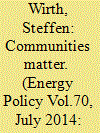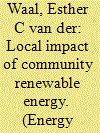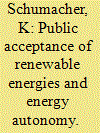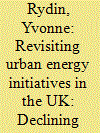|
|
|
Sort Order |
|
|
|
Items / Page
|
|
|
|
|
|
|
| Srl | Item |
| 1 |
ID:
180176


|
|
|
|
|
| Summary/Abstract |
Can community energy help to overcome inequalities in who benefits from low-carbon technologies? Research has shown that the distribution of low-carbon technology subsidies and their associated benefits can be highly uneven across socioeconomic groups, revealing a persistent inequality issue. Yet this research has tended to focus almost exclusively on adoption of technologies at the household-level, with limited insights into whether and how this distribution might differ in the case of community energy. To address this, this paper quantitatively investigates the distribution of payments to household- and community-level energy systems across socioeconomic groups in Scotland under the UK government feed-in-tariff. Analysis is conducted on a novel dataset of 26,218 household and community wind and solar installations across 6,976 micro-level data-zones using a combination of distributional analysis and random effects within-between regression. It finds that feed-in-tariff payments for household-level wind and solar PV systems have heavily benefitted more affluent socioeconomic groups, while payments to community energy projects have flowed more consistently into areas of higher deprivation, particularly in the case of community solar. These findings suggest that community energy has been successful in bringing the benefits of low-carbon technologies to areas of lower income and higher deprivation, with important lessons for policymakers concerned with a just transition going forward.
|
|
|
|
|
|
|
|
|
|
|
|
|
|
|
|
| 2 |
ID:
166503


|
|
|
|
|
| Summary/Abstract |
Community renewable energy initiatives are increasingly recognized as important actors to trigger citizen investments in renewable energy facilities. Little is known, however, about the factors that determine the size of financial investments made by community renewable energy members. To address this gap, this paper presents a multivariate econometric analysis of the economic, social, environmental and institutional determinants of the size of investments in community renewable energy. It relies on a large-scale survey of 4061 members of two renewable energy cooperatives located in Flanders, in the northern part of Belgium. Results show that the return on investment is the most important determinant for members of large communities of interest, while environmental, social and other non-economic drivers tend to dominate financial motives for members of smaller communities of place. The presence of other cooperative members in close social networks plays a particularly important role in the latter kind of communities, highlighting the strength of social interactions as a driver for investments. These results can help policy-makers to design more adapted policy measures for fostering financial investments at the community level, and project developers to tailor segmented communication strategies about the goals and benefits of projects.
|
|
|
|
|
|
|
|
|
|
|
|
|
|
|
|
| 3 |
ID:
162944


|
|
|
|
|
| Summary/Abstract |
The use of auctions for determining the level of renewable energy remuneration is increasing. A cause for concern is the resulting potential to exclude smaller investors from the market, in particular community energy projects. However, empirical evidence and examination of resulting consequences have been insufficient so far. This article analyses the effects a shift from guaranteed remuneration to auctions might have on incentives to start new community wind projects, analysing the case of Germany. It thus contributes to research on investor-specific impacts of renewable energy policy instruments. An explanatory sequential mixed-method design was applied, combining surveys and interviews for the collection of expert assessments. The developed typology allows the assessment of the respective potential of different wind project types for procedural and distributive justice, which are understood to support local acceptance. Wind projects developed by the local community were found to be most beneficial for local acceptance, but appear to face the highest challenges in auctions. A crowding out of these projects would be particularly unfortunate with regard to the need to expand wind energy capacities much more. It is recommended that policy makers ensure a level playing field, also within the context of auctions, for wind projects developed by the local community.
|
|
|
|
|
|
|
|
|
|
|
|
|
|
|
|
| 4 |
ID:
132833


|
|
|
|
|
| Publication |
2014.
|
| Summary/Abstract |
Energy transitions are high on political agendas. From a practical viewpoint, community approaches are deemed essential in order to transition from a predominantly centralized energy supply to a decentralized one, and to exploit the potential of renewable energies. In this paper, I discuss how the emergence of community-based energy projects can be analyzed from an institutional perspective. In this context, a 'community' is treated as an individual institutional order that shapes decisions. I examine how community structures the implementation of biogas cooperatives in the Autonomous Province of South Tyrol in Northern Italy. My findings suggest that 'community spirit', a cooperative tradition, and the norms of locality and responsibility are central drivers behind the emergence and constitution of biogas cooperatives. Not only do these institutional features of community influence the decision concerning which farmers are in or out but also plant location and scale. I argue that 'community' is a necessary analytical category for understanding community energy.
|
|
|
|
|
|
|
|
|
|
|
|
|
|
|
|
| 5 |
ID:
168686


|
|
|
|
|
| Summary/Abstract |
Dominant conceptual models describe energy innovations as struggles between regime and niche actors that develop at the margins of established energy systems, and work against dominant energy regimes. Contrary to this conceptualisation, this paper argues that energy innovations develop through a more nuanced set of relationships, which lead to distinct innovation outcomes. Based on three case studies in Germany and Scotland, this paper finds that energy innovations develop in accordance with, independent of, or in opposition to regime structures, showing that a project's relative position within these structures influences the type and quality of its development. Making use of situational analysis, the paper challenges essentialising tendencies among scholars working with the multi-level perspective. Instead of understanding regime and niche as separable entities, situational analysis allows understanding how agency and innovations of local renewable energy projects transcend the boundaries of levels or systems. Policy makers are advised to acknowledge these complex interrelations. Side effects of policies deliberately directed towards other sectors might have significant effects on the energy sector.
|
|
|
|
|
|
|
|
|
|
|
|
|
|
|
|
| 6 |
ID:
177314


|
|
|
|
|
| Summary/Abstract |
Electrical energy storage (EES) has the potential to facilitate the transition to renewable energy supply in the future as it brings flexibility into the electricity network. Uncertainties exist around regulation, commercial models, technology and cost but EES is recognized among experts as being part of the solution. This study offers an economic analysis of the role of EES in the low-voltage (LV) network as shared asset between rooftop photovoltaic (PV) system owners, distribution network and energy trading companies. A conceptual analysis of relevant drivers, such as increasing distributed energy resources (DER; primarily rooftop PV), decreasing EES cost, and expected benefits are assessed in a case study using annual sample data from a distribution network in eastern New South Wales, Australia. The study finds that shared EES located in the LV network, if joint revenue from PV customers, distribution network and energy trading companies is captured, can become NPV positive in 2023 and bring additional benefits to a range of stakeholders. A 500 kWh battery located next to a transformer and mitigating up to 30% overload is found to be optimal. However, multiple regulatory challenges need to be overcome to enable shared usage of EES in vertically disintegrated energy sectors.
|
|
|
|
|
|
|
|
|
|
|
|
|
|
|
|
| 7 |
ID:
169881


|
|
|
|
|
| Summary/Abstract |
The UK energy sector has been one of large-scale centralised energy production by big companies, with households seen as passive consumers of energy at the end of wires. The development of renewable energy technologies, such as solar photovoltaics (PV), signals greater potential for small-scale energy production. Such change provides the opportunity for households and communities to become active consumers and producers of energy, as well as for energy service providers to support integration of renewable technologies. Drawing on data from a community energy study, the paper shows how community energy projects can be test beds for developing new business models, leading to empowerment and democratisation as important stepping stones to mainstream community energy. The paper adds to existing knowledge about these challenges by developing possible future pathways to mainstream community energy: top-down; bottom-up; and hybrid. These pathways’ potential contribution to decarbonising the energy sector is considered, with implications for policy, regulation and new business models.
|
|
|
|
|
|
|
|
|
|
|
|
|
|
|
|
| 8 |
ID:
126532


|
|
|
|
|
| Publication |
2013.
|
| Summary/Abstract |
This paper analyses the development of community energy in the UK by comparing it to Germany in relation to decentralisation, scales and ownership structures particularly of wind energy. Varying approaches to energy generation at the community scale provide interesting insights into the impact of policy innovation as well as the capacity of national energy frameworks to foster socially innovative engagement practices beyond the purely technological diffusion of innovations. By examining interactions between technological and social innovations with the help of a qualitative analysis, opportunities for potential generators not traditionally engaged in energy generation to tap into these innovation systems are analysed. This paper suggests that greater commitment to diversification beyond the implementation of policy measures such as the feed-in tariff is required to provide communities with the capacity to develop new generation practices in terms of scale and ownership. The UK in particular is struggling to protect these new generation practices which allow communities to derive benefits facilitated by specific energy policy measures according to their potential. It concludes by indicating areas where niche protection might need to be expanded if community energy is to play a greater role in the UK's ambitious transition to a low-carbon economy.
|
|
|
|
|
|
|
|
|
|
|
|
|
|
|
|
| 9 |
ID:
171506


|
|
|
|
|
| Summary/Abstract |
Local benefits of community renewable energy (CRE) –ranging from an increase in social cohesion, jobs, services, knowledge and skills - are widely assumed in academia and among policy makers. However, there are both a lack of evidence on these impacts and a lack of formal impact assessment methodologies to assess them. This research explores change mapping, an impact assessment methodology, to contribute to evaluative frameworks for assessment of the effects of CRE projects on their host communities. With this methodology, the local impacts of a 900 kW community wind project on the Scottish island Shapinsay are assessed, using an exploratory survey, interviews, and two focus group sessions. When it comes to the local impacts, the biggest changes residents experience are either direct or indirect effects of the RE revenues. Modest but ostensible effects are visible on local economic development, social cohesion, and knowledge and skill development. From the case study can be concluded that community-ownership of energy technologies can indeed be empowering, but also creates vulnerability. Stable energy policies and support during the operational phase are needed to keep up the stream of RE income that functions as a source of independent income.
|
|
|
|
|
|
|
|
|
|
|
|
|
|
|
|
| 10 |
ID:
190604


|
|
|
|
|
| Summary/Abstract |
As the Dutch policy of public participation in renewable energy projects takes momentum, lessons from Zeeuwind -a successful energy cooperative-can help improve resilience of the emerging energy cooperatives. Our results are based on thirty-five-year data from newspapers, resulting in a database of 584 news articles. We conclude that the Dutch policies for small-scale energy initiatives have not been consistent and alignment of policies between different levels of governance was missing. Despite these challenges, Zeeuwind achieved economic resilience, which was made possible through multiple factors, unique among them are: 1) Zeeuwind’s origin in the environmental NGO at the provincial level, which provided it with the necessary knowledge and network for a strong start. 2) The memberships of municipalities. 3) The focus on the level of the province to site new projects. 4) A contract of ten years with the energy incumbent. 5) The strategic decision to expand the technological portfolio. 6) Expansion of business through new partnerships and joint ventures. For scaling of Dutch energy cooperatives and improving their resilience, we recommend strengthening institutional structures that facilitate local cooperatives to participate in large renewable energy projects by building their organisational capacity via trainings and network building, legitimacy creation from political incumbents, and increased collaboration with energy incumbents.
|
|
|
|
|
|
|
|
|
|
|
|
|
|
|
|
| 11 |
ID:
116959


|
|
|
|
|
| Publication |
2012.
|
| Summary/Abstract |
What explains the galvanising of communities to participate actively in energy projects? How do groups mobilize to overcome the often formidable barriers highlighted in the existing literature? Drawing on original qualitative research of 100 community energy groups in Scotland, including six in-depth case studies, we explain how effective mobilization occurs and the political dynamics surrounding such mobilization. To capture these dynamics, we adapt theories offered by literature on social movements, with a particular focus on resource mobilization theories. Applying our adapted framework, we identify two particular sets of resources shaping community energy mobilization: (i) structural resources, which refer to the broad political context structuring and constraining opportunities for community energy mobilization; and (ii) symbolic resources-less tangible resources used to galvanise participants. We investigate to what extent our case study groups were able to draw upon and exploit these resources. We find that structural resources can either facilitate or hinder mobilization; what matters is how state resources are exploited and constraints mitigated. The use of symbolic resources was highly effective in aiding mobilization. Each of the groups examined - despite their considerable variation - effectively exploited symbolic resources such as shared identity or desire for strong, self reliant communities.
|
|
|
|
|
|
|
|
|
|
|
|
|
|
|
|
| 12 |
ID:
163541


|
|
|
|
|
| Summary/Abstract |
In the context of climate change mitigation and increasing decentralized generation of energy from renewable sources, public acceptance of renewable energy (RE) has become an important issue in energy research. Many studies have addressed public acceptance through a case-based empirical lens with rather specific conclusions for individual technologies in a given context. This paper draws more universal insights by conducting an online survey on public acceptance for a set of technologies in the three sub-regions of the Upper Rhine region (URR). Using a representative dataset of 495 German, 501 French, and 493 Swiss inhabitants of the URR, several hypotheses from the acceptance literature are tested across sub-regions and RE technologies and results are compared to related empirical studies from the literature. Moreover, we explore for the first time how public acceptance is linked with community energy and energy autonomy. The latter is especially important to understand how policy and project initiators can mobilise the population to contribute to the energy transition. Our main findings are that public acceptance is, inter alia, highly dependent on the technology in question, the dimension of social acceptance (community versus socio-political dimension) and previous experiences with RE technologies.
|
|
|
|
|
|
|
|
|
|
|
|
|
|
|
|
| 13 |
ID:
179699


|
|
|
|
|
| Summary/Abstract |
Policy makers in various countries have made the development of community energy, especially in the form of a renewable energy cooperative (REC), a goal of energy policy. Weaknesses in qualifications of REC management teams have been identified by previous research as a barrier for the further development of RECs, especially when implementation of new business models is needed. Our study is the first to examine in detail the qualifications (human capital) and networks (social capital) of REC management; our data comes from online survey responses from 187 board members of 125 RECs in Germany. We analyzed how many RECs are planning to implement new business models, finding that less than half of the surveyed RECs are planning to do so. Those REC boards that are planning new business models will require skills in sales and marketing, but REC management has qualification weaknesses and gaps in their networks precisely in these two areas. RECs could remedy these problems by bringing onboard new management team members with complementary qualifications and networks, partnering with other RECs and organizations, and training management team members. Policy makers committed to community energy can support RECs through training programs and assistance in building partnership networks.
|
|
|
|
|
|
|
|
|
|
|
|
|
|
|
|
| 14 |
ID:
162304


|
|
|
|
|
| Summary/Abstract |
Renewable Energy Sources (RES) offer a key transformative potential from a social point of view due to their modularity and capacity to generate energy at local level, allowing for the development of democratic and participative bottom-up initiatives. Spanish RES cooperatives, unlike other European countries, are few in number. Here, we review their development by applying the Multi-Level Perspective approach. Spanish RES cooperatives have recently come up against a hostile regulatory and economic context, which has induced specific organizational and operating structures such as the application of innovative participation methods and investment tools. Spanish RES cooperatives regularly collaborate in sharing learning processes and experiences, having also demonstrated their capacity to spread new ideas at both social and political levels. However, despite their growth and territorial spread over the last few years, RES cooperatives still have a minor presence in the Spanish energy system. Although some internal factors may limit their potential as an active instrument towards the transition to RES in the country, the regime's resistance is found to be the main barrier. This paper concludes with some recommendations for policy makers and RES cooperatives to enhance its potential role in the forthcoming energy transition process.
|
|
|
|
|
|
|
|
|
|
|
|
|
|
|
|
| 15 |
ID:
166519


|
|
|
|
|
| Summary/Abstract |
Battery storage systems can balance the intermittency of renewable energy sources. Lithium-ion systems exhibit a declining price trajectory alongside a growing demand. However, little is known about consumer preferences and appropriate business models for storage systems. This paper presents an analysis of German adopters of a photovoltaic system (n = 752) and interested non-adopters (n = 84) to investigate their preferences for lithium-ion storage systems. In a choice experiment respondents had to choose among different system configurations. Respondents preferred choosing none of the presented systems over choosing a system. Potential for the residential and community storage concept with joint usage is found. High levels of autarky have a high utility. Consumers favor ownership over use rights and are willing to give up control to provide services for the grid. Market opportunities for cooperatives, regional power providers, and new market entrants exist. The study can assist in creating customer-focused business models and implementing multi-purpose use cases with value for different actors in the energy system.
|
|
|
|
|
|
|
|
|
|
|
|
|
|
|
|
| 16 |
ID:
166497


|
|
|
|
|
| Summary/Abstract |
In the first decade of the 21st century, there was considerable interest in the potential for reducing the reliance on centralised energy systems and introducing greater decentralisation through localised initiatives, particularly in urban areas. A range of such initiatives were evidence of an emerging movement for bottom-up change in energy systems. This involved a variety of actors, technologies, economic models and modes of engagement with the public. Indeed, research undertaken in the UK found over 50 possible pathways for change based on such urban energy projects. However, the following decade has seen considerable changes in the context for such initiatives, particularly with regard to national policy frameworks. Returning to a database collected in 2010–11, this paper analyses the nature of the projects that have survived and those that have not. It finds that the hope of localised urban action for changing energy systems rests largely with community-based projects, but that these are fragile, with limited capacity and dependent on having a sound financial model for their survival. The paper concludes with suggestions for how such localised urban action could be reinvigorated but also assesses the current role of such local action.
|
|
|
|
|
|
|
|
|
|
|
|
|
|
|
|
| 17 |
ID:
110728


|
|
|
|
|
| Publication |
2011.
|
| Summary/Abstract |
Many decisions about future energy systems in small communities are based on the visions of several key actors about the ideal-type system. Although meaningful, such visions may not inclusively represent the objectives of all relevant actors. Moreover, the visions are mostly intuitively judged by these actors and reflect their experiences and concerns. Yet, analytical expertise provides essential information about the required decisions and their consequences. We argue that coming up with a number of alternative visions about a future energy system and addressing these visions from both intuitive and analytical perspectives leads to better-quality decisions. This paper presents a case study in the small Swiss community of Urnäsch, where actors from practice and academia collaborated in a transdisciplinary process to address the future energy system. Visions of these actors about the ideal-type energy system were linked both with energy scenarios that analytically specified options to implement these visions and with stakeholder-based multi-criteria assessment of the consequences. As a result, most of the involved actors adjusted their initial vision preferences. Thus, we believe this approach could lead to capacity building and formation of stable, informed preferences, which are necessary to support a transition in the coming decades.
|
|
|
|
|
|
|
|
|
|
|
|
|
|
|
|
| 18 |
ID:
177453


|
|
|
|
|
| Summary/Abstract |
Renewable energy communities (RECs) are citizens, SMEs or local governments who collectively invest, produce and use local renewable energy, with private citizens controlling a majority stake. As part of efforts to increase the share of sustainable energy production, RECs could play an important role. However, barriers to participation remain. Given their importance within RECs, it is of interest to understand what determines citizen’s intent to participate in a REC. Using an extended model of Ajzen's Theory of Planned Behaviour, we examined the impact of attitude, subjective norms and perceived behavioural control on people’s intent to participate in a REC in Flanders, Belgium. We include several antecedents of both perceived behavioural control, attitude and intent, including economic, social, behavioural and attitudinal variables. Using structural equation modelling, data of 727 participants are analysed. Our results indicate that attitude and subjective norms are both strong predictors of intent, while perceived behaviour has a significant, but modest impact. We additionally find significant relationships between attitudes towards renewable energy, environmental concern, financial gain and willingness to change behaviour and attitude towards renewable energy communities. We discuss our results in light of previous work in this domain and formulate recommendations for increasing REC participation.
|
|
|
|
|
|
|
|
|
|
|
|
|
|
|
|
|
|
|
|
|